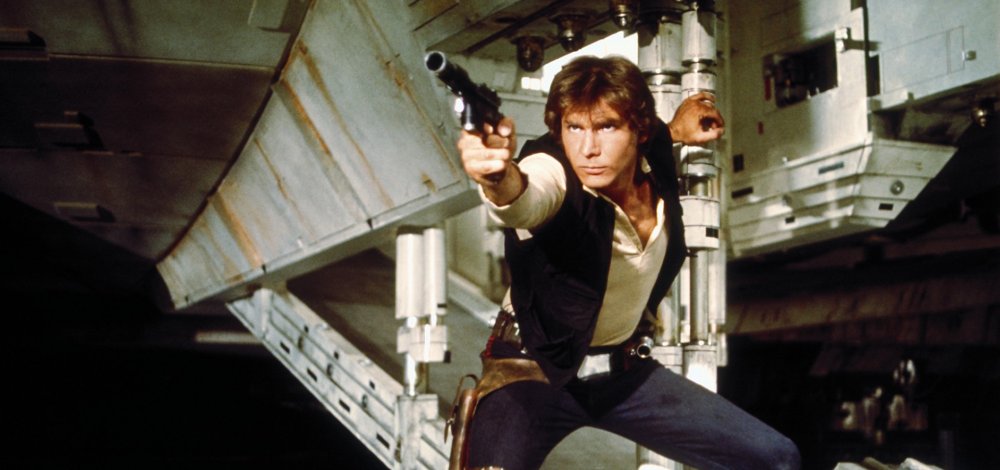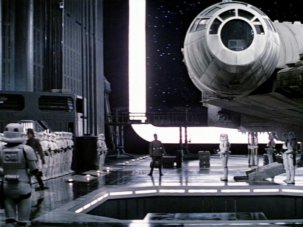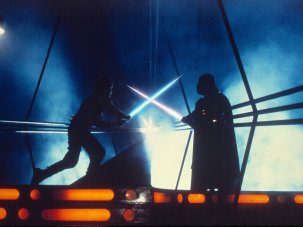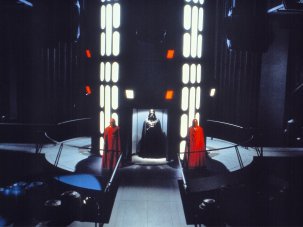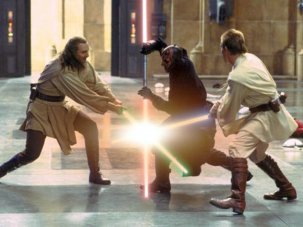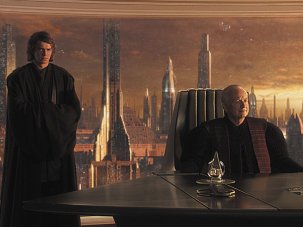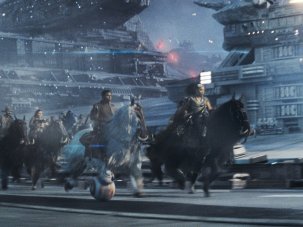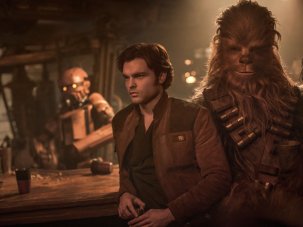Having elevated itself to the top of the all-time box-office poll, Star Wars has pulled off a feat of spiritual legerdemain more impressive than all the religious connotations of ‘the Force’ within the film. It has transformed itself from a mere movie into a phenomenon – which is both a gain and a loss, since it becomes almost impossible to react to the film with anything but awed approval or brusque dismissal.
USA 1977
Certificate U 124m 35s
Director George Lucas
Cast
Luke Skywalker Mark Hamill
Han Solo Harrison Ford
Princess Leia Organa Carrie Fisher
Grand Moff Tarkin Peter Cushing
Ben Obi-Wan Kenobi Alec Guinness
C-3PO Anthony Daniels
R2-D2 Kenny Baker
Chewbacca Peter Mayhew
Darth Vader David Prowse
Uncle Owen Phil Brown
Aunt Beru Shelagh Fraser
[2.35 : 1]
Original title Star Wars
Original US release date 25 May 1977
Original UK release date 27 December 1977
Distributor Twentieth Century Fox (now Disney)
starwars.com/films/star-wars-episode-iv-a-new-hope
► Trailers
Whatever its qualities as a piece of filmmaking, it becomes interesting primarily as an exercise in programming: the Pavlovian machinery which has gone into action to capture more people than the last great blockbuster of audience participation, Jaws. Both films are a product of new generation Hollywood: made by directors who have already been film buffs, and whose grasp of movie lore and magic is of a simpler but more overpowering kind than that of, say, Hitchcock, the past master of building audience responses into his films. Star Wars offers more varied pleasures of this kind than Jaws, but is less cleanly engineered and executed; Jaws is based on one compelling premise – fear of the deep, the unknown – where Star Wars is monumentally empty, based on not a single idea but a wealth of conceits.
Most of these are recognition effects, for Star Wars may be the first movie to appeal to film buffs who would never dream of calling themselves that, drawing as it does on a host of popular movie types. It could scarcely be termed science fiction at all – at least not as it has been practised for 20 years – but, as Lucas has indicated in naming Flash Gordon and Edgar Rice Burroughs as his inspiration, a simple space adventure, now overlaid with sterile nostalgia and multi-levelled movie puns.
The antics and back-chat routines of the two robots who take up so much screen time (and who at one point were mooted as the film’s heroes) occasionally have an Oz-like charm (“We seem to be made to suffer, it’s our lot in life”) but more often suggest the cute animal companions that fill up Disney films; sequences are elaborately set up to help us reminisce, from a western saloon brawl with laser guns (“Sorry for the mess,” quips good guy Han Solo, tossing a coin on the bar as he leaves) to the 633 Squadron bombing raid that demolishes the villains at the end.
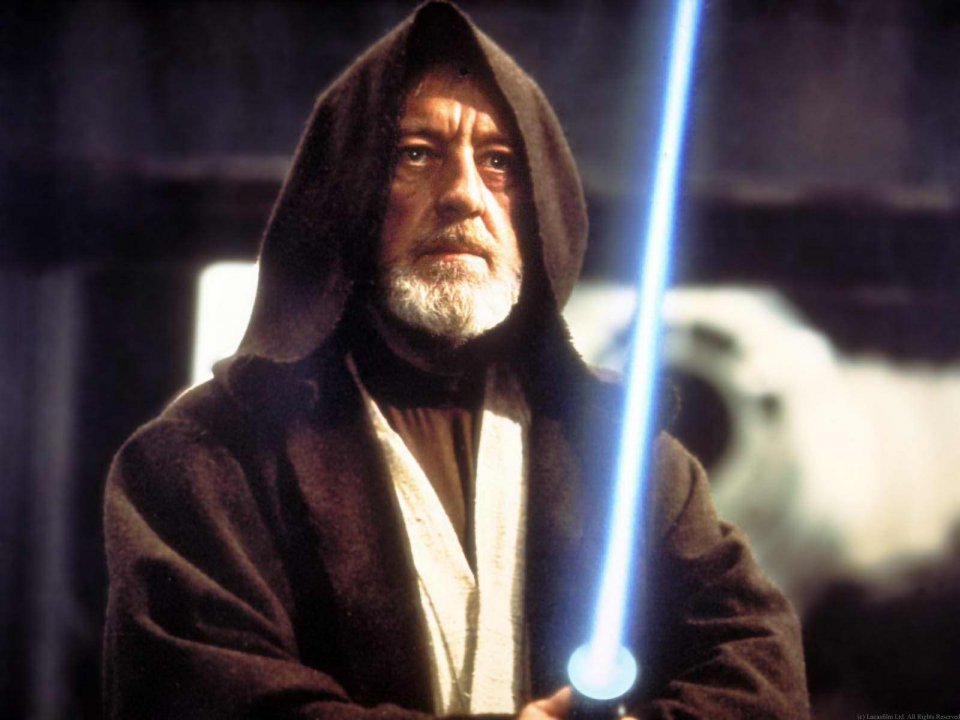
Alec Guinness as Ben Obi-Wan Kenobi
Lucas’s specific references point straight to the more contradictory, even self-destructive, aspects of the project. There is a homage to The Searchers when Luke Skywalker returns from his meeting in the desert with Obi-Wan Kenobi and finds his guardians’ settlement ablaze, and one to Triumph of the Will in the final victory march of the champions of republican right. But as the first has little emotional resonance, and the second no political application in this world of feudal struggle, they seem rather dislocated gimmicks, and lead one to question why Lucas needs such hints of sophistication, and such a complicated technological apparatus, to reach back to the tatty serials and comic-lore of his childhood.
The discrepancy between the naivety the film pretends to and the know-how (and knowingness) that went into its making results in strange lacunae and a resounding emptiness overall. Despite the amount of hardware on display, and the up-to-date technology that went into the design and special effects, Lucas never lets us into the workings of this world except in terms of the comic-book oppositions of good and evil. The film is thus deprived of the purpose of most science fiction (of Lucas’s own THX 1138, in fact): to provide the ‘culture shock’ of showing the present transformed, or extended, into the future.
This flight into atavistic fantasy is undoubtedly successful on some levels, notably in its sheer narrative speed and its nice trick of beginning in medias res, dropping the audience into what seems to be a continuing serial, with a long rolling title explaining the story so far. In other respects, the recreation is less than half convincing, particularly in the concept of ‘the Force’ – the mystical power exercised by the Jedi knights which once bound the galaxy in sweetness and light. Without the simple spiritual convictions of his predecessors, or the philosophical speculations of his contemporaries, Lucas has rather left his audience out in the cold, with only regularly administered shots of special effects to keep them warm.
The original Star Wars teaser trailer
Star Wars Episode IV: A New Hope trailer
-
The 100 Greatest Films of All Time 2012

In our biggest ever film critics’ poll, the list of best movies ever made has a new top film, ending the 50-year reign of Citizen Kane.
Wednesday 1 August 2012
-
The Digital Edition and Archive quick link
Log in here to your digital edition and archive subscription, take a look at the packages on offer and buy a subscription.




